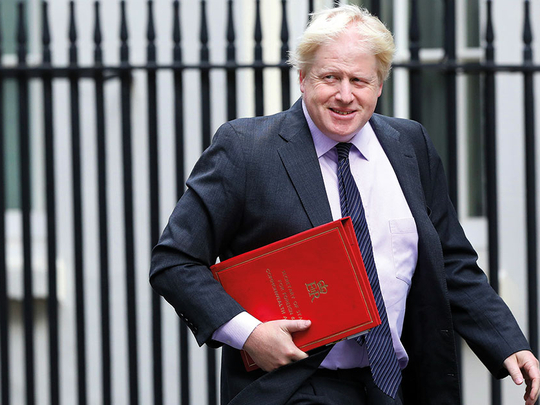
London: Muslim women who wear burqas should be defended in the same way as Christians who wear a crucifix, a senior Conservative said on Wednesday, amid a growing row over Boris Johnson’s comments on face veils.
Ruth Davidson, the leader of the Scottish Conservatives, said debate over burqas and crosses was “the same argument but in a different faith” and that the former foreign secretary’s remarks were offensive. Her comments came as Jeremy Wright, the Culture Secretary, said it was wrong to label face veils “oppressive”.
The Conservatives, however, were accused of losing touch with voters as a poll showed 60 per cent of Britons think burqas should be banned in public places.
A former deputy mayor of London of Pakistani descent said the Tory leadership was siding with “a minority fringe of Islamists” who labelled any criticism of Islamic practice as Islamophobia, while another prominent Muslim said the burqa “deserves to be ridiculed”.
There were also claims that the burqa row was being used as a proxy for Remain-supporting MPs to attack Johnson in an attempt to kill off his leadership ambitions, after Dominic Grieve, an arch-Europhile, said he would quit the party if Johnson ever became leader. And as Lord Shaikh, the Muslim Conservative peer, called for “severe action” against Mr Johnson, Lord Pickles, the Remain-supporting former communities secretary, said he had been given more “slack” than other Tories would be.
However, there were accusations of hypocrisy after it emerged that some of Johnson’s critics had made disparaging comments about the wearing of burqas in the past.
Mr Johnson said burqas were “oppressive” and made women look like “bank robbers” or “letter boxes” in his column for The Daily Telegraph on Monday, in which he argued against a ban on wearing them.
The prime minister told him to apologise, but he made it clear on Tuesday that he did not feel any need to do so. He made no further comment on the matter yesterday.
Arguments over Johnson’s choice of language gave way to a wider debate yesterday over whether Britain should follow France, Denmark and Belgium in banning burkas in public.
Some Muslims argue that the Quran requires women to dress modestly and cover their heads and bodies, but opponents of the burqa say there is no specific requirement in Islamic texts for women to wear them, and accuse Muslim men of forcing women to cover themselves from head to toe.
Davidson, who is widely seen as a future Tory leader, described Johnson’s comments as “gratuitously offensive”. She said: “If you use the analogy of Christianity, would you ever write in The Telegraph that you should have a debate about banning Christians from wearing crucifixes? It’s the same argument but it’s in a different faith so why are the parameters different for one faith and not the other?”
Asked by the BBC about Johnson saying face veils were oppressive, Wright replied: “That’s the sort of language I think we should try to avoid.”
Lord Shaikh said the party should remove the whip from Johnson, adding: “Why not? He’s not a super-human being, he’s a member of the party.”
Grieve said: “I don’t regard him as a fit and proper person to lead a political party and certainly not the Conservative Party,” as he said he would quit the Tories if he became leader.
A poll by Sky News, however, suggests the Conservative leadership is out of step with voters. It found that 60 per cent of people do not believe Mr Johnson’s comments were racist, with the same proportion supporting a ban on the burqa, even though Johnson is opposed to one.
Majid Nawaz, the reformist Muslim and head of the Left-of-centre counter-extremism think tank Quilliam, said the burqa deserved to be “ridiculed”, as was “the uniform of medieval patriarchal tyranny”. “It victim-blames women for their beauty. Where this is enforced it symbolises violent misogyny. I’m not advocating banning this monstrosity but I refuse to defend it. It deserves to be ridiculed, not the women inside it.”
One senior Conservative warned that May’s response could prove to be an “own goal” for the party because “it sets the bar incredibly low for future investigations into the actions of MPs and councillors”.
Munira Mirza, Johnson’s deputy when he was mayor of London, said: “There are many people in this country who are uncomfortable about the burqa. There is a minority fringe of Islamists that pipe up every time someone tries to criticise any part of Islamic practice that call this Islamophobia. The establishment including the leadership of the party are siding with them, are saying you cannot use this kind of language.”
She added: “The reality is there is a political fight here. People who frankly couldn’t care less about the issues that Muslim women face are piling into Boris because Boris said it ... Ken Clarke described it as bag. I don’t remember Anna Soubry, Sayeeda Warsi and others calling for his resignation.”
Remain-supporting Soubry, who said she “never saw an armed robber who looked like a woman in a burqa”, previously described wearing the burqa as “a peculiar choice”.
The Labour Party also faced accusations of hypocrisy after citing Mr Johnson’s comments as evidence of Tory Islamophobia, after it emerged that Emily Thornberry, the shadow foreign secretary, had said in the past that she would not want someone wearing a burqa to look after her children.
Sadiq Khan, the Labour Mayor of London, has previously described face veils as “insidious”.
Conor Burns, an ally of Mr Johnson, accused Tory colleagues of jumping on a “bandwagon”.
Tory MP Nadine Dorries criticised MPs who defend the burqa while wanting to ban “grid girls” from Formula 1. She added: “You cannot expect a society that celebrates gay pride and embraces gay marriage to live harmoniously when condoning the suppression of women forced to cover up, segregate and become invisible.”












